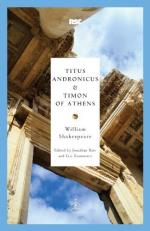|
This section contains 8,374 words (approx. 28 pages at 300 words per page) |

|
SOURCE: "The Big Idea: Timon of Athens," in Shakespeare and Tragedy, Routledge & Kegan Paul, 1981, pp. 74-95.
In the following essay, Bayley asserts that Timon of Athens ultimately fails as a tragedy because the extreme nature of the movement from complete generosity to absolute misanthropy allows no room for the development of the "natural pressure of life" that arises in Shakespearean drama. The critic nevertheless notes that the play's poetry is characterized by "all the marks of late Shakespearean mastery—it is terse and elliptic, leaping between word and idea with arbitrary and yet persuasive power."'
Admirers of Timon of Athens have responded to it in rather the same way. Timon is not someone whose consciousness can be entered, as Coleridge and so many since felt they entered that of Hamlet, but any Romantic wishing to cultivate the persona of misanthrope could take Timon as an exemplar. Noble...
|
This section contains 8,374 words (approx. 28 pages at 300 words per page) |

|


